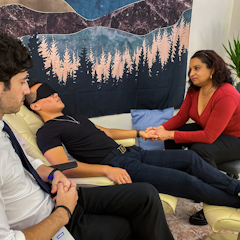
Articles on African Americans
Displaying 1 - 20 of 305 articles

Since the 1930s, the federal government has made payments to victims of financial hardships and social injustices. But for those suffering from the harms of slavery, the US remains silent.

Ghana has long attracted African Americans who have suffered racial injustices in the US.

Beefs often target Drake’s race, constructing him as a Canadian who is not Black enough to claim an authentic connection to African-American hip hop culture.

The Black hosts of the ‘Fresh & Fit’ podcast speak in the parlance of social justice movements, but apply it, in a twisted way, to justify misogyny.

Beyoncé’s country-inspired album has caused a stir because the country music scene has a history of racial segregation that has erased its Black roots and gatekept it from Black artists.

Racial threats and slights take a toll on health, but the continual invalidation and questioning of whether those so-called microaggressions exist has an even more insidious effect, research shows.

The release of ‘American Fiction’ presents an opportunity to talk about race, power and white supremacy: What version of Blackness is acceptable or saleable within American culture?

In this episode, Vinita sits down with two experts to break down the many layers — and Black stereotypes — in the much anticipated new film, ‘American Fiction.’

Norman Lear brought the first nuclear Black family to prime-time television in 1974.

Clinical psychologist and professor Monnica Williams is on a mission to bring psychedelics to therapists’ offices to help people heal from their racial traumas. To do this, she’s jumping over some big hurdles.

Led by a Black businessman named Bob Douglas, the New York Rens, who played their first game on Nov. 3, 1923, became one of the best basketball teams in the country.

Student journalists are using spreadsheets and databases to examine one of the darkest chapters in American history.

Black would-be homeowners pay the price when big investors buy up the neighborhood.

A sociologist interviewed more than 200 Black workers about their experiences. Here’s what she found.

African immigrant writers possess particularly acute insights into the way race and racism affect daily life in the US.

People who object to affirmative action were more likely to discriminate against job candidates with Black-sounding names than those who supported it, whether or not they had to rush.

As the “Queen” of gospel music, Mahalia Jackson sang two songs during the historic March on Washington. But her most famous line may have been a suggestion to Rev. Martin Luther King Jr.

While a Florida curriculum implies that enslaved Africans ‘benefited’ from skills acquired through slavery, history shows they brought knowledge and skills to the US that predate their captivity.

The new museum opened at a time when the teaching of Black history is under attack by conservative politicians.

At a time when Americans celebrated their nation’s independence, it’s clear not every American enjoys the same constitutional rights.
